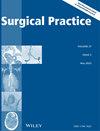放射组学与人工智能在胰腺肿瘤与非肿瘤疾病鉴别诊断中的应用。审查
IF 0.3
4区 医学
Q4 SURGERY
引用次数: 0
摘要
本文综述了放射学诊断和人工智能(AI)在胰腺疾病诊断中的最新进展。放射化学分析和人工智能的结合使得对包括胰腺癌在内的胰腺疾病的诊断更加准确和精确。本文重点介绍了放射组学分析的不同阶段,如数据收集、预处理、肿瘤分割、数据检测和提取、建模、统计处理和数据验证,这些对胰腺疾病的准确诊断至关重要。此外,本文还评估了人工智能和人工神经网络在外科和肿瘤胰腺学中应用的可能性。介绍了放射化学分析和人工智能在胰腺癌诊断和预后中的特点和优势。这些进步有可能改善患者的预后,因为早期和准确的诊断可以导致早期治疗和更好的康复机会。然而,也注意到在胰腺学中使用放射测量和人工智能的局限性,例如缺乏标准化和假阳性或假阴性的可能性。尽管如此,这项工作强调了在胰腺疾病的诊断和治疗中结合放射化学分析和人工智能的潜在益处,这最终可以带来更好的患者护理和结果。本文章由计算机程序翻译,如有差异,请以英文原文为准。
Radiomics and artificial intelligence in the differential diagnosis of tumor and non-tumor diseases of the pancreas. Review
This work provides a comprehensive overview of the recent advancements in the field of radiomic diagnostics and artificial intelligence (AI) in the diagnosis of pancreatic diseases. The integration of radiochemical analysis and AI has allowed for more accurate and precise diagnoses of pancreatic diseases, including pancreatic cancer. The review highlights the different stages of radiomic analysis, such as data collection, preprocessing, tumour segmentation, data detection and extraction, modeling, statistical processing, and data validation, which are essential for the accurate diagnosis of pancreatic diseases. Furthermore, the review evaluates the possibilities of using AI and artificial neural networks in surgical and oncological pancreatology. The features and advantages of using radiochemical analysis and AI in the diagnosis and prognosis of pancreatic cancer are also described. These advancements have the potential to improve patient outcomes, as early and accurate diagnosis can lead to earlier treatment and better chances of recovery. However, the limitations associated with the use of radiometry and AI in pancreatology are also noted, such as the lack of standardization and the potential for false positives or false negatives. Nevertheless, this work highlights the potential benefits of incorporating radiochemical analysis and AI in the diagnosis and treatment of pancreatic diseases, which can ultimately lead to better patient care and outcomes.
求助全文
通过发布文献求助,成功后即可免费获取论文全文。
去求助
来源期刊

Surgical Practice
医学-外科
CiteScore
0.90
自引率
0.00%
发文量
74
审稿时长
>12 weeks
期刊介绍:
Surgical Practice is a peer-reviewed quarterly journal, which is dedicated to the art and science of advances in clinical practice and research in surgery. Surgical Practice publishes papers in all fields of surgery and surgery-related disciplines. It consists of sections of history, leading articles, reviews, original papers, discussion papers, education, case reports, short notes on surgical techniques and letters to the Editor.
 求助内容:
求助内容: 应助结果提醒方式:
应助结果提醒方式:


